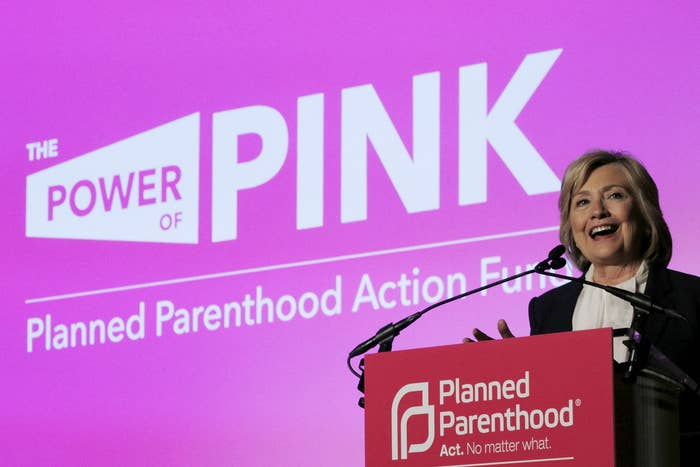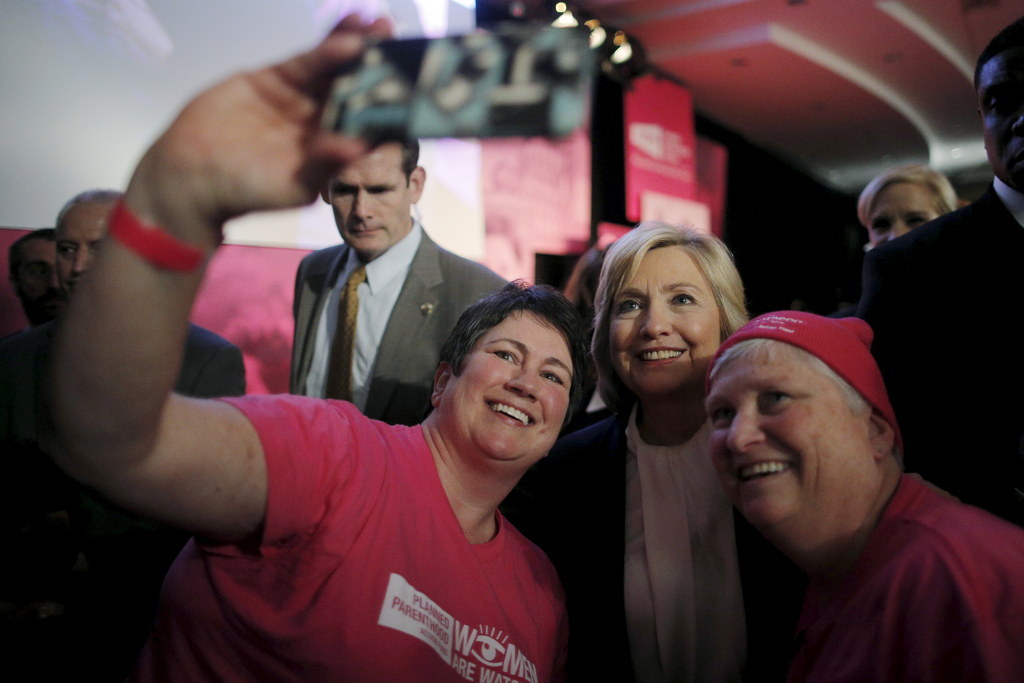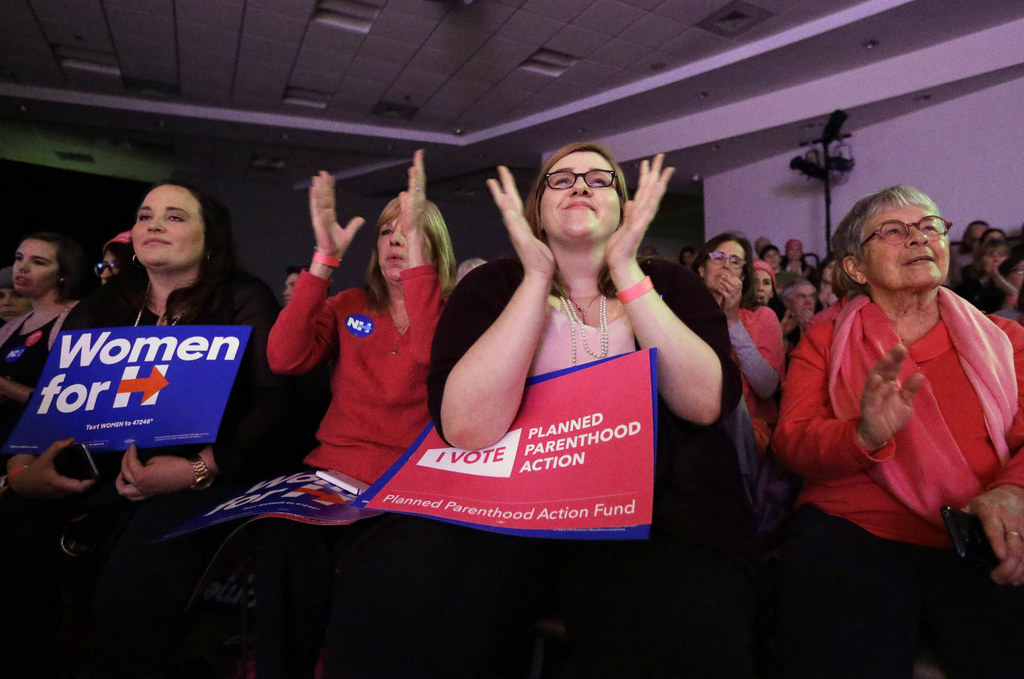
DAVENPORT, Iowa — Regardless of whether Democratic caucus-goers stand for Hillary Clinton or Bernie Sanders next week, they’ll be standing for a candidate who wants to end the Hyde Amendment, the ban on federal funds being used for most cases of abortion.
Clinton and Sanders agree on abortion policy, and they’ve long drawn praise from abortion rights activists. But the leadership at the biggest names in the abortion rights movement have backed Clinton, and many are campaigning for her in Iowa and even firing off some of the toughest shots at Sanders before Iowa caucus day.
The difference between the two: In Clinton, the advocates see a candidate who promises a revolution in abortion politics in America.
Clinton, they say, is more aggressive in her calls to expand abortion access, and that means a future in which Democrats no longer tip-toe around the issue. No more hopes that abortions are “legal, safe and rare” (as Clinton said in July in an interview with a New Hampshire newspaper) or suggestions that abortion is “a difficult and painful choice” (as Sanders said in a September speech at Liberty University). Abortion rights activists are aiming for a future in which they can de-stigmatize abortion and make expanded, inexpensive access to it a core tenet of American progressive politics.
Clinton has been far from perfect on the topic this cycle, according to activists. For example, she upset abortion rights supporters when she distanced herself from Planned Parenthood after the release of undercover videos that accused the group of selling for profit fetal tissue and featured Planned Parenthood employees talking about procedures in detail.
But they’re excited by her recent language on the topic, and the most powerful voices in the abortion rights movement have now lined up squarely behind her campaign.
On the trail, that’s meant Clinton has spoken about not just maintaining the current Democratic position on abortion rights, but expanding it — backing federal funding for abortion coverage and increased government support to Planned Parenthood. Sanders supports those things, too, but Clinton talks about frequently, and has framed it as a core part of her agenda.
Clinton’s language on the topic makes the abortion rights movement think a Clinton presidency would entail new rhetoric that will change the way abortion politics work. Which, by the way, is exactly what Sanders’s abortion rights supporters also think they’re going to get from him.
The different visions for the same thing are neatly explained by looking at the issue of Hyde, the Washington shorthand for a political compromise on abortion that has been a part of the federal budgeting process since 1976.
After the Roe v. Wade decision in 1973, Medicaid began paying for abortion coverage for benefits recipients. Abortion rights opponents in Congress wanted that to end and threatened to halt funding for the Department of Health and Human Services until it was. Eventually the two sides agreed on Hyde: an annually-passed “policy rider” to the HHS funding bill that prevents government money from going to abortion except in cases of rape, incest, and the health of the mother.
The result, according to studies by abortion rights proponents, was that poor women and women of color could not get access to abortion coverage in the same way that wealthier, white women could. This is unacceptable to the abortion rights movement, which sees abortion access as a tool of economic empowerment.
So abortion rights groups have tried for decades to get Hyde scrapped. But anti-abortion lawmakers and activists have maintained enough votes on both sides of the aisle in Congress to make that impossible. The abortion rights advocates say many Democrats would rather not get involved in the issue at all — and that’s what activists are trying to change with the 2016 presidential primary.

Ilyse Hogue, the president of NARAL Pro-Choice America — which backed President Obama in 2008 and is backing Clinton in 2016 — said Clinton has been more forceful about her desire to get rid of Hyde this cycle, a shift in rhetoric that is necessary to move Democrats into a place where they can get it done.
"We're getting killed all over this country. And we've gotten killed with lots and lots of solid voting records in Congress,” Hogue said. “And we're not doing our jobs if we're not recognizing that reality and demanding more. And only one candidate made that call for more and it was Hillary."
Lucy Flores, a congressional candidate from Nevada and a rising star in Democratic women’s circles, became a nationally-known figure in July 2014 when, as a state lawmaker, came out with the story of her own abortion during a debate over a sex-ed bill. She was 16 years old when she terminated the pregnancy that she told fellow lawmakers she wasn’t ready for. It wasn’t a story of regret, she said, it was a story of solidarity with other young women who become pregnant before they’re ready. The public admission of an unregretted abortion is exactly the tone for abortion politics that abortion rights activists hope to see more Democrats adopt.
Flores has endorsed Sanders, and her take on Hyde is exactly the same as Hogue’s — but her solution is precisely the opposite. It’s only a Sanders-led political revolution that can put an end to Hyde.
"The Hyde amendment comes up every single year and we have been able to do nothing about it. And the reason why we haven't been able to do anything about it is because of the systemic failure of our political system right now,” she told BuzzFeed News. “If we do not change the way that we do business in this country, then what's going to happen? We're going to vote on the Hyde amendment again, it's going to fail again. I mean what makes anybody think that continuing to do the same thing over and over and over again is going to produce different results?"
Flores says she doesn’t care about talk when it comes to abortion — records matter most. Sanders’s promised revolution in American politics, and the leftward tilt that would come with it, would bring the end of Hyde and other changes to abortion policy, she said.
“To me, it's about what we're going to do and not so much about who talks about something more so than the other,” Flores said.
For her part, Hogue says talk is extremely important when it comes to abortion politics. As president of NARAL, she helped oversee a new criteria for political endorsements that takes rhetoric into account. That’s one big reason Clinton got the endorsement over Sanders, who has a 100% score in NARAL’s legislative scorecard.

“What's required is not just voting right, but introducing and co-sponsoring legislation and using your platform, whether it's on the floor or the stump to make the issues of abortion access and reproductive freedom central to the political debate,” she said.
Election politics have entered into the abortion debate in recent days, with Clinton allies calling Sanders essentially dishonest when it comes to abortion.
On Friday, Clinton aide Teddy Goff, formerly a creator of viral content for the Obama campaigns, tweeted a gif of Mitt Romney laughing aloud with a link to a Sanders campaign Roe v. Wade anniversary tweet, in which Sanders said: “no one will be a stronger defender of a woman's right to choose than me.”
EMILY’s List, which also backs Clinton, pushed the rhetoric on Sanders and abortion further on Friday. “Bernie Sanders does not have what it takes,” EMILY’s List president Stephanie Shriock wrote on Medium, saying that when it comes to abortion politics, “Bernie Sanders just doesn’t get it.”
It was a step up in rhetoric from the previous week, when in an interview with BuzzFeed News, Shriock said of Sanders and abortion, “He’s a good vote. But that’s not enough right now.”
(The intervening period included the release of Sanders’ health care plan, which was light on details and made no mention of women or any other group. Clinton supporters also leaped on Sanders’s claim that abortion rights groups who endorsed Hillary Clinton over him “are, in fact, part of the establishment.” He later reversed himself after Clinton campaign fueled outrage.)
Clinton supporters are, of course, looking for every opportunity to score political points in an increasingly tight primary, but abortion rights advocates insist they’re keeping their distance from negative attacks on Sanders, who they say remains a strong ally of their movement.
"I actually reject the notion that pointing out where a candidate can do better or fails to match where a candidate has done better is going negative. That's exactly what advocates do to make sure that our issues are central and that there is a mandate on them when people get elected,” Hogue said. “You're not going to see one ad on the air from us, one mailing in the mailbox, that has anything but positive things about Hillary Clinton. There's no negative campaigning against Bernie. Because we don't think we have to. We save the negative stuff for the guys who are actually our opponents.”
In an interview just prior to the Clinton endorsement, Planned Parenthood president Cecile Richards told BuzzFeed News that Sanders was an ally but Clinton was a leader when it came to abortion politics. She steered clear of going negative on Sanders.
“Sen. Sanders has always been a very reliable vote and supporter as has Gov. O’Malley,” she said. “I have absolutely nothing but good things to say about them. I think the difference is that Sec. Clinton hasn’t just defended reproductive rights, she has made expanding women’s opportunities, both domestically and globally, part of her entire life.”
Asked if Richards wanted to add to her comments in the wake of the recent abortion-focused days in the Democratic primary, an aide to Richards declined.
A side-by-side Clinton-Sanders comparison tool posted by Planned Parenthood praises Sanders over and over, but explains the group endorsed Clinton over a stronger commitment to rhetoric pushing for change in abortion policy.
"Bottom Line: Sanders and Clinton are Both Good on Reproductive Health," the site reads. "But Clinton Pushes Harder."

Sanders says Clinton's supporters are playing political games with his words, and that he's behind the abortion rights movement 100%.
“If I’m not mistaken, I have a 100 percent lifetime voting record with NARAL, a 100 percent voting record with Planned Parenthood,” Sanders told the Washington Post Saturday. “To be attacked for that is, I think, unfortunate. It’s unfortunate, and it’s obviously wrong. I’m a fierce believer in a woman’s right to choose, and as president, I will do everything I can to take on those people around the country who are making it more and more difficult for a woman to choose.”
Abortion has already dominated parts of the 2016 cycle — and with congressional investigations into Planned Parenthood and general election talk about choosing Supreme Court justices looming, the issue seems poised to play a more significant role this year than in past presidential years. Activists have already seen gains that they want: Both Clinton and Sanders discuss their support for it at every campaign stop, and both candidates draw sharp contrasts with a conservative Republican Party that’s become more anti-abortion. But they want something bigger than that.
Hogue said NARAL will be a strong supporter of either Sanders or Clinton, whomever wins in the end.
“There is no comparison between any of our candidates and the race to the bottom on the side,” she said, referring to the GOP. “Sen. Sanders is a great ally and we will 100% support him if he wins the nomination.”
But she said it’s completely fair game for her group to push legislative allies like Sanders to go further in their rhetoric.
“What civil rights activist has ever said, 'Uh oh, I better not ask more of my friends, even though we're suffering on a daily basis?'” she said.
